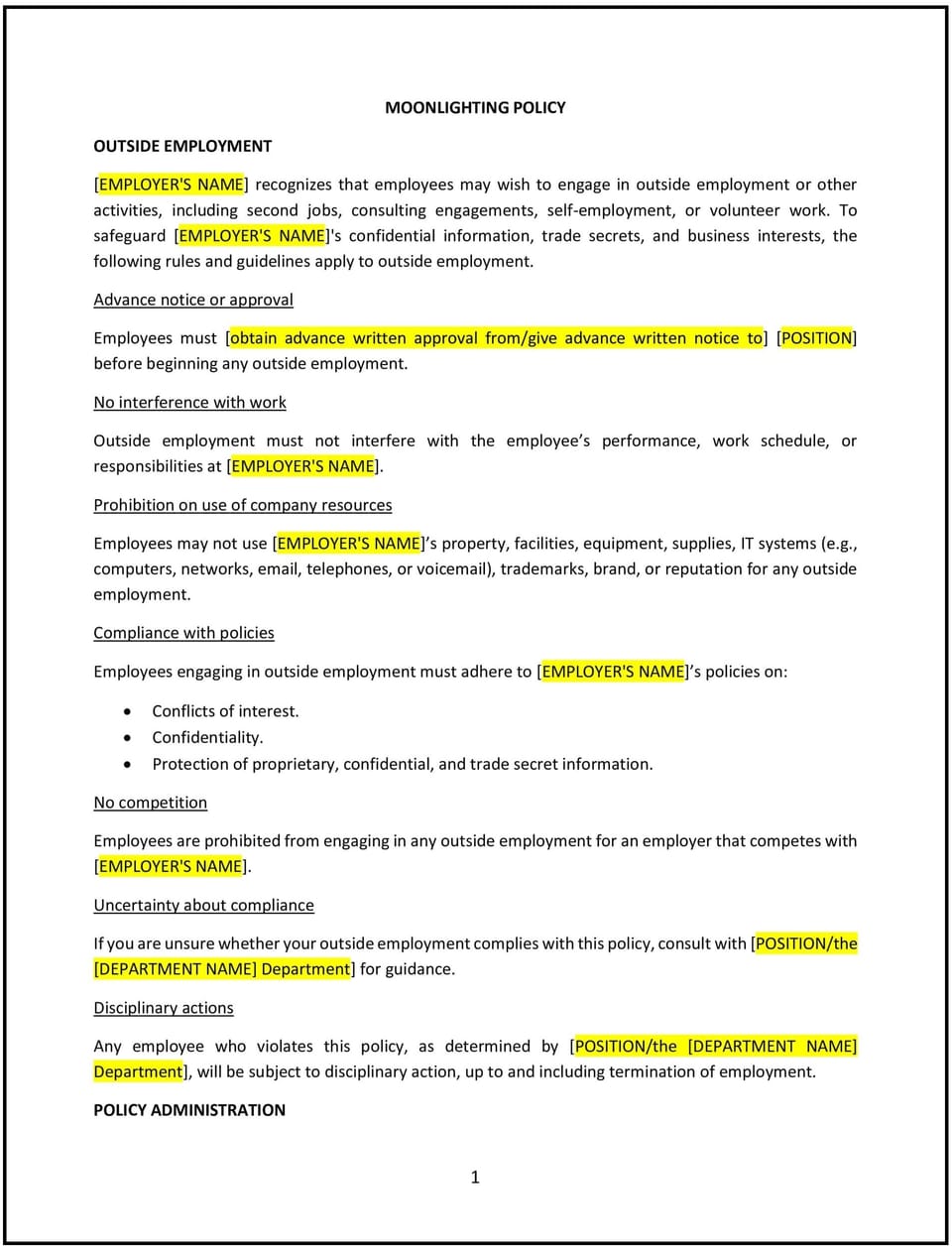Moonlighting policy (Idaho): Free template

Moonlighting policy (Idaho)
A moonlighting policy helps Idaho businesses address employees who hold secondary jobs or engage in outside work while employed. This policy outlines guidelines for disclosing outside employment, potential conflicts of interest, and the impact on primary job performance. It also emphasizes the importance of maintaining productivity, confidentiality, and loyalty to the business.
By implementing this policy, businesses can set clear expectations, protect their interests, and ensure employees remain focused on their primary responsibilities.
How to use this moonlighting policy (Idaho)
- Define moonlighting: Clearly explain what constitutes moonlighting, including secondary jobs, freelance work, or other outside employment. This ensures employees understand the policy’s scope.
- Require disclosure: Establish a process for employees to disclose outside employment, including the type of work, hours, and potential conflicts of interest. This helps the business assess the impact on the employee’s primary role.
- Address conflicts of interest: Outline guidelines for identifying and managing conflicts of interest, such as working for competitors or using company resources for outside work.
- Set performance expectations: Emphasize that outside employment must not interfere with the employee’s primary job responsibilities, including attendance, productivity, and quality of work.
- Protect confidential information: Reinforce the importance of safeguarding company information, trade secrets, and intellectual property, even when engaging in outside work.
- Establish consequences: Clearly state the consequences of violating the moonlighting policy, such as disciplinary action or termination, to ensure accountability.
- Review and update the policy: Periodically assess the policy’s effectiveness and make adjustments based on business needs, employee feedback, or changes in Idaho labor laws.
Benefits of using this moonlighting policy (Idaho)
This policy provides several advantages for Idaho businesses:
- Maintains productivity: Clear guidelines help ensure employees remain focused on their primary job responsibilities, minimizing distractions from outside work.
- Protects business interests: The policy safeguards confidential information and reduces the risk of conflicts of interest that could harm the business.
- Promotes transparency: Requiring disclosure of outside employment fosters trust and open communication between employees and management.
- Reduces legal risks: A well-defined policy helps businesses address potential issues, such as conflicts of interest or misuse of company resources, in a structured manner.
- Enhances workplace fairness: Consistent application of the policy ensures all employees are treated equally when engaging in outside work.
- Supports employee accountability: Clear expectations and consequences help employees understand their responsibilities and the importance of prioritizing their primary job.
Tips for using this moonlighting policy (Idaho)
- Communicate the policy clearly: Share the policy with employees during onboarding and through internal communication channels to ensure awareness and understanding.
- Train managers: Provide training for managers on how to handle moonlighting disclosures, assess conflicts of interest, and enforce the policy consistently.
- Encourage transparency: Foster a culture where employees feel comfortable disclosing outside employment without fear of retaliation.
- Monitor compliance: Regularly review moonlighting disclosures and address any potential issues, such as conflicts of interest or performance concerns, promptly.
- Document everything: Maintain records of disclosures, approvals, and any actions taken to enforce the policy, ensuring accountability and transparency.
- Review the policy regularly: Update the policy as needed to reflect changes in business operations, workforce dynamics, or Idaho labor laws.
Q: Why should Idaho businesses have a moonlighting policy?
A: A moonlighting policy provides clear guidelines for employees engaging in outside work, helping businesses maintain productivity, protect confidential information, and address potential conflicts of interest.
Q: What should businesses consider when allowing moonlighting?
A: Businesses should assess whether outside employment interferes with the employee’s primary job responsibilities, creates conflicts of interest, or risks exposing confidential information.
Q: How should employees disclose outside employment?
A: Employees should notify their manager or HR department in writing, providing details about the type of work, hours, and potential conflicts of interest.
Q: What constitutes a conflict of interest in moonlighting?
A: Conflicts of interest may include working for a competitor, using company resources for outside work, or engaging in activities that could harm the business’s reputation or interests.
Q: How can businesses address performance issues related to moonlighting?
A: Businesses should address performance concerns through regular feedback, performance improvement plans, or disciplinary action if the employee’s outside work negatively impacts their primary job.
Q: What steps should businesses take to protect confidential information?
A: Businesses should include confidentiality clauses in the moonlighting policy and provide training to employees on safeguarding company information, even when engaging in outside work.
Q: How often should businesses review their moonlighting policy?
A: Businesses should review the policy annually or as needed to ensure it aligns with current business needs, workforce dynamics, and Idaho labor laws.
This article contains general legal information and does not contain legal advice. Cobrief is not a law firm or a substitute for an attorney or law firm. The law is complex and changes often. For legal advice, please ask a lawyer.


